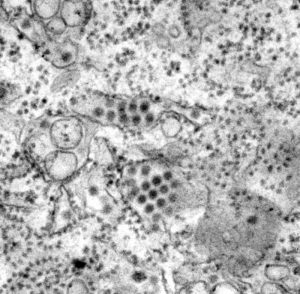NewsDesk @bactiman63
Takeda today announced the company’s dengue vaccine, QDENGA® (Dengue Tetravalent Vaccine [Live, Attenuated]) (TAK-003), was approved by the Indonesia National Agency for Drug and Food Control, Badan Pengawas Obat dan Makanan (BPOM), for the prevention of dengue disease caused by any serotype in individuals six years to 45 years of age.

QDENGA is the only dengue vaccine approved in Indonesia for use in individuals regardless of previous dengue exposure and without the need for pre-vaccination testing.
QDENGA® (TAK-003) is a dengue vaccine that is based on a live-attenuated dengue serotype 2 virus, which provides the genetic “backbone” for all four dengue virus serotypes and is designed to protect against any of these serotypes
“Dengue can affect anyone living in or traveling to endemic areas – regardless of age, health and socio-economic circumstances,” said Gary Dubin, president of Takeda’s Vaccine Business Unit. “Developing this innovative dengue vaccine has been an exciting challenge, and its approval in Indonesia is an important achievement for Takeda and for public health. We’re proud to introduce QDENGA as a new dengue prevention tool to the people of Indonesia, and we will continue to work with additional regulatory agencies to make QDENGA available globally.”
Dengue is a mosquito-borne viral disease that poses a significant global public health threat, with prevalence in over 125 countries. In recent years, Indonesia has experienced almost half of the dengue disease burden within Southeast Asia and continues to suffer from one of the highest burdens of dengue in the world. In the first half of 2022 alone, Indonesia reported over 63,000 dengue cases and nearly 600 deaths spread across 455 cities in 34 provinces.
“As a doctor, I have seen firsthand the burden dengue disease places on the patients and communities I serve in Indonesia. There is an ongoing fear of an outbreak and contracting the disease, experiencing the physical setbacks dengue can cause as well as the potential financial impacts,” said Dr. Anggraini Alam, Sp.A(K), pediatric infectious disease consultant. “Vaccination will offer health care providers in Indonesia a welcomed advancement in dengue prevention, along with vector control, allowing us to reduce the burden of dengue and protect the broader population.”
The approval of QDENGA is based on results through three years after vaccination from the ongoing Phase 3 Tetravalent Immunization against Dengue Efficacy Study (TIDES) trial that enrolled over 20,000 healthy children and adolescents ages four to 16 years living in dengue-endemic areas in Asia and Latin America. QDENGA demonstrated continued overall protection against dengue illness and hospitalization three years after vaccination, regardless of an individual’s previous dengue exposure. QDENGA has been generally well tolerated, with no important safety risks identified in the TIDES trial, to date. Takeda recently presented long-term safety and efficacy results from the TIDES trial through 54 months of follow-up, which further validated the vaccine’s efficacy and safety profile.
In Indonesia, QDENGA is indicated for the prevention of dengue disease caused by any dengue virus serotype in individuals six years to 45 years of age and should be administered subcutaneously as a 0.5 mL dose at a two-dose (0 and 3 months) schedule pursuant to approved dosing regimen.


One thought on “Dengue vaccine: Takeda’s QDENGA approved in Indonesia”